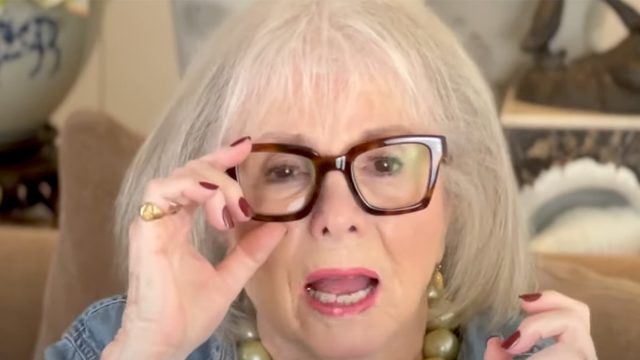83-Year-Old Woman Drops 13 Pounds With 5 Simple Habits
We've all been there – standing on the scale, promising ourselves that losing just a few pounds would make everything better. When traditional diets failed, Sandra Sallin found an unexpected solution at age 83. This award-winning Pro Aging blogger and accomplished artist, whose paintings hang in museums, has lived an extraordinary life – from flying Spitfire planes over Dover to being kissed by wolves in TV commercials. No, she shares her surprisingly simple approach to weight loss that finally worked. Read on to discover how she lost 13 pounds using gentle, sustainable changes anyone can make.
The Truth About Weight Loss After 60
"Keeping a healthy weight is a worthwhile goal at any age. As you get older, it can get trickier," says WebMD. However, while "you might not be burning calories like you did when you were younger, you can still take off extra pounds."
The Breaking Point: When Enough Was Enough
"I gained a lot of weight between Covid, being older after menopause, and not being careful about what I ate," Sandra says in her post. "Every time I went to the doctor, the scale kept inching up until I reached a weight where I thought, 'No, that's not okay anymore.'" She was particularly motivated after checking her BMI: "I did those BMI tests, and it said I was overweight, which is not healthy. I was aghast, and I was so upset that I thought, 'You know what? I'm going to lose weight.'"
Why Traditional Methods Weren't Working
Like many of us, Sandra tried various approaches. "I'd done the Weight Watchers thing and lost the weight, only to gain it back again," she explains. "Avoid fad diets because the results don't last," says WebMD, adding the "golden rules of weight loss: Burn more calories than you eat or drink."
The Unexpected Catalyst for Change
A surprising turn of events led to Sandra's breakthrough. Following radiation treatment that made swallowing difficult, she had to modify her eating habits. "For about ten days, I had to eat very little because it hurt so much," Sandra recalls. "Eat more small meals and snacks, and don't go much longer than 3 hours without eating," says WebMD. As a nutritionist at Foodtrainers in New York. Joanna Li, RD, explains, "Because your metabolism is already slow if you're starving yourself, it just gets slower."
The Simple Strategy That Made All the Difference
Sandra's approach centers on mindful eating. "I pay attention to how much I eat and stop when I feel comfortable, not stuffed," she explains. This naturally led her to follow WebMD's recommendation to "eat more veggies, fruits, whole grains, fish, beans, and low-fat or fat-free dairy; and keep meat and poultry lean."
Sweet Cravings? Try This Apple Trick
Instead of completely depriving herself, Sandra found a clever substitute for desserts. "Apples are so sweet and delicious. If you feel like having a piece of candy, take an apple and slice it. Somehow, the sweetness of the apple just satisfies me," she shares. This aligns perfectly with WebMD's advice to "limit empty calories, like sugars and foods with little or no nutritional value."
The Power of Mindful Eating and Hydration
Sandra discovered that changing how she ate was as important as what she ate. WebMD underlines the importance of hydration: "Sometimes, thirst masks itself as hunger. As you get older, you may not be as quick to notice when you're thirsty." The recommendation is to get 64 ounces of water a day, which you can get from both beverages and water-rich foods.
Finding Your Exercise Sweet Spot
Exercise played a crucial role in Sandra's success. "I know we've all got something, but when you can exercise or if you can do a recumbent bike, do it," she encourages. WebMD supports this approach, noting that "you lose muscle mass as you age. Offset that by doing strength training. You can use weight machines at a gym, lighter weights you hold in your hands, or your own body weight for resistance like in yoga or Pilates."
The Scale Strategy That Works
Sandra developed a practical approach to weighing herself that prevented discouragement. "I don't weigh myself every day because if I don't lose weight, I'll get depressed," she shares. This mindful approach helps her stay motivated while following WebMD's advice that "you may need fewer calories than you did when you were younger."
The Results Speak for Themselves
Through this approach, Sandra has lost 13 pounds at a healthy pace of about a pound per week. "When the doctor went to weigh me and came back and said, 'You've lost three pounds since the last time I've seen you,' I was thrilled," she shares. "If I'm losing weight, you can do it. I don't have a nutritionist, trainer, or chef. I'm just paying attention to my body and eating until I'm comfortable, not stuffed."
RELATED: Doctor Lost 6 Pounds in 30 Days Testing This Supplement
Additional Health Considerations
Sandra emphasizes the importance of medical oversight: "Get your thyroid checked," she advises. WebMD says that professional medical guidance is essential, recommending that older adults "ask your doctor or a registered dietitian" about their specific caloric needs and dietary restrictions. As Sandra notes, even details like biotin supplementation can affect medical tests: "The endocrinologist had me go off biotin while he was testing to see where I was with my thyroid." And if you enjoyed this article, take advantage of these 15 Quick Ways to Lose Body Fat Percentage in a Week.





